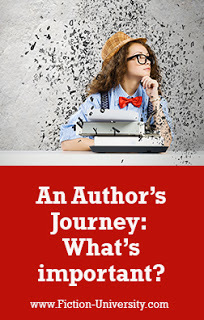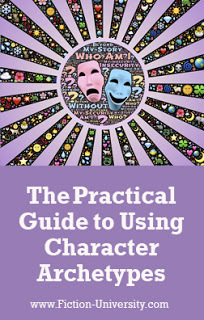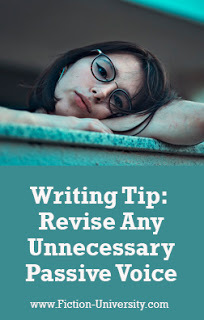Janice Hardy's Blog, page 80
March 18, 2019
Get a Clue: We All Need a Little Mystery in Our Novels
 By Janice Hardy, @Janice_Hardy
By Janice Hardy, @Janice_HardyI'm still recovering from "conference brain" after five days away. In honor of SleuthFest (which was awesome), here's a dip into the archives on why every writer should add a little mystery and wonder to their novel. Enjoy!
A good friend of mine writes mysteries, and when she first started reading my fantasies (the novels, not the other kind) she remarked that she’d never be able to make up an entire world like I did. I found it impressive that she could write in the real world and not have the luxury of making stuff up when she needed it.
Two totally different writers approaching their stories from two totally different perspectives, but what we both agreed on, was that all stories need a sense of mystery and wonder. Without mystery, stories just aren’t any fun.
I think as writers, we can get so caught up the plot and characters, showing all the cool things we created, and making sure the technical stuff is working, that we forget readers want more than just "good writing." They want a story they can get lost in. A puzzle to solve. They want to figure out the truth and be surprised.
Continue ReadingWritten by Janice Hardy. Fiction-University.com

Published on March 18, 2019 03:00
March 7, 2019
An Author’s Journey: What’s important?
 By Ray Flynt
By Ray FlyntPart of The Writer's Life Series
JH: Whether they take the traditional path or the indie path to publication, writers face similar challenges to achieve their dreams.
Two decades ago, I had the opportunity to hear Maya Angelou speak. She told the story of another presentation she’d given to inspire writers and artists, after which a teenaged girl approached and said, “Listening to you, I’ve decided what to do with my life. I want to be a star.” Our audience, comprised of adults, appreciated the irony.
Just as billions of galaxies comprise the universe, millions of writers fill an authors’ cosmos—all struggling to let their work shine through and find an audience. Stardom is for an elite (and lucky) few. There is no such thing as an overnight success. Whomever might be billed as such, has toiled mightily to hone their skills to perfection and—at last—earned recognition for their talent. Anyone who claims a modicum of success has a story to tell of a buried manuscript, or an early endeavor no longer worthy of association with the advancements in their craft. Salmon during spawning season have nothing on artists who swim upstream against a tide of competition, all yearning for the attention and affection of readers.
Continue ReadingWritten by Janice Hardy. Fiction-University.com

Published on March 07, 2019 03:00
March 6, 2019
The Practical Guide to Using Character Archetypes in Your Novel
 By Janice Hardy, @Janice_Hardy
By Janice Hardy, @Janice_HardyCharacter archetypes are a useful tool in creating characters for a novel.
At some point in your writing journey, you’ve probably come across the term archetype. This has no doubt led you to articles quoting Carl Jung (the father of psychology) and his twelve character types. Pursuing that further, led to multiple articles about the variations of those and the common archetypes used in fiction.
And then your head likely started spinning and you wondered how the heck any of that was going to help you write a better novel.
Personally, I think there’s a difference between Jungian archetypes and fictional archetypes. Jung’s focus was on defining the human psyche, not telling a grand tale, so his list tends be more thematic in nature. Which is great if you’re writing literary fiction with Deep and Meaningful Themes, but not so great for the rest of us.
Continue ReadingWritten by Janice Hardy. Fiction-University.com

Published on March 06, 2019 05:52
March 5, 2019
6 Gadgets to Take to Your Next Book Event
 By Chrys Fey, @ChrysFey
By Chrys Fey, @ChrysFeyPart of The Writer’s Life Series
JH: Whether you go indie or traditional, odds are you’ll do book and author events. And events mean ways to interact with readers on the marketing and sales side of the biz. Please help me welcome Chrys Fey to the lecture hall today, to share some gadgets and gizmos that help make an author’s life a little easier.
Chrys Fey is the author of Write with Fey: 10 Sparks to Guide You from Idea to Publication . Catch the sparks you need to write, edit, publish, and market your book! From writing your novel to prepping for publication and beyond, you’ll find sparks on every page, including 100 bonus marketing tips. Fey is an editor for Dancing Lemur Press and runs the Insecure Writer’s Support Group’s Goodreads book club. She is also the author of the Disaster Crimes series. Visit her blog, Write with Fey, for more tips.
Website | Facebook | Twitter | Goodreads | Blog | Newsletter
Take it away Chrys…
Continue ReadingWritten by Janice Hardy. Fiction-University.com

Published on March 05, 2019 03:00
March 4, 2019
You Get One Page to Hook a Reader. Yes, Really.
 By Janice Hardy, @Janice_Hardy
By Janice Hardy, @Janice_Hardy Most readers really do decide before the end of the first page if they’re going to keep reading.
A lot of attention and pressure is put on the opening page of a novel, but for good reason. It’s the first impression a novel makes on a reader, and if the reader isn’t hooked in some way, they won’t move on to the second page. As unfair as it seems, 250 words (roughly one page) is all you get to convince readers to stay with your story and your book.
But you don’t have to pack the entire story into that first page. All you have to do is give readers something that promises them that your novel will be worth reading. Which is much easier to do in a single page.
One caveat before we move on: I’m referring to new novels and authors without an established readership. If you know you like an author, you typically buy their new book without reading a test page first. Well-known authors and bestselling novels can also skip the “testing” phase of a new reader based on reputation and personal recommendations.
Continue ReadingWritten by Janice Hardy. Fiction-University.com

Published on March 04, 2019 06:05
March 3, 2019
Sunday Writing Tip: Revise Unnecessary Passive Voice
 By Janice Hardy, @Janice_Hardy
By Janice Hardy, @Janice_Hardy Each week, I’ll offer a tip you can take and apply to your WIP to help improve it. They’ll be easy to do and shouldn’t take long, so they’ll be tips you can do without taking up your Sunday. Though I do reserve the right to offer a good tip now and then that will take longer—but only because it would apply to the entire manuscript.
This week, revise unnecessary passive voice.
Passive voice is when the subject of the sentence gets all the action instead of the subject doing the acting. Such as, “The ball was thrown by Troy” vs. “Troy threw the ball.”
The easiest way to find passive voice, is to look for "to be" verbs: is, am, are, was, were, be, have, had, has, do, does, did, has been, have been, had been, will be, will have been, being. By is another red flag word often seen mixed in with passive voice, such as “Kenny was run over by the runaway snowmobile” vs. “The runaway snowmobile ran over Kenny.”
Continue ReadingWritten by Janice Hardy. Fiction-University.com

Published on March 03, 2019 05:32
March 2, 2019
Real Life Diagnostics: Does This Romantic Thriller Opening Work?
 Critique By Maria D'Marco
Critique By Maria D'Marco Real Life Diagnostics is a weekly column that studies a snippet of a work in progress for specific issues. Readers are encouraged to send in work with questions, and we diagnose it on the site. It’s part critique, part example, and designed to help the submitter as well as anyone else having a similar problem.
If you're interested in submitting to Real Life Diagnostics, please check out these guidelines.
Submissions currently in the queue: Four
Please Note: As of today, RLD slots are booked through April 6.
This week’s question:
Does this opening work?
Market/Genre: Romantic Thriller
On to the diagnosis…
Continue ReadingWritten by Janice Hardy. Fiction-University.com

Published on March 02, 2019 04:54
March 1, 2019
Choosing the Right Words for the Scene: Subtle Changes Can Make a Difference
 By Janice Hardy, @Janice_Hardy
By Janice Hardy, @Janice_Hardy This week's Refresher Friday takes an updated look at how a single word or phrase can alter how a sentence reads. Enjoy!
It always tickles me how a single edit can dramatically effect a piece of writing. The power of language and how we choose to wield it is what sets one writer apart from another. It's in our voices, our styles, and how we tell our tales.
Mark Twain famously calls it the difference between lightning and a lightning bug, but it's more than that. The decision to use filter words versus not, to use description versus internalization, to embrace a character's voice or the author's voice--these choices all shape the writing in unique ways. It's also why ten writers can take the same premise and create ten different novels. Just look at how many re-tellings exist, from Romeo & Juliet, to fairy tales, to stories that all draw from the same thematic archetype.
The words we choose matter. It makes a story ours.
Continue ReadingWritten by Janice Hardy. Fiction-University.com

Published on March 01, 2019 03:00
February 28, 2019
Scheduling for Writing Success
 By Shanna Swendson, @ShannaSwendson
By Shanna Swendson, @ShannaSwendson Part of The Writer’s Life Series
JH: Finding time to write is a challenge many writers face--even when writing is their full-time job. Please help me welcome Shanna Swendson to the lecture hall today, to share a tip that helped her optimize her writing life.
Shanna Swendson earned a journalism degree from the University of Texas but decided it was more fun to make up the people she wrote about and became a novelist. She’s written a number of fantasy novels for teens and adults, including the Enchanted, Inc. series and the Rebel Mechanics series. She devotes her spare time to reading, knitting, and music.
Website | Twitter | Facebook | Goodreads
Take it away Shanna…
Continue ReadingWritten by Janice Hardy. Fiction-University.com

Published on February 28, 2019 05:00
February 27, 2019
One Common Way Writers Weaken Their Descriptions
 By Janice Hardy, @Janice_Hardy
By Janice Hardy, @Janice_Hardy Good description doesn’t just list the facts.
I recently came across an article by Chris Winkle over at Mythcreants that resonated with me, because it's something I’ve written about a lot here—choosing the right description details and how that ties into point of view. Chris referred to it as listing facts instead of establishing relevance, which sums this idea up perfectly.
Everything in a novel is basically “description,” because it’s our job as writers to describe the story to our readers. We have multiple tools to do that, from dialogue, to narrative, to exposition and more, but it’s how we choose to wield those tools that sets an "okay" book apart from a "great" book. There’s a difference between describing what’s in a room and having a character interact with it.
Continue ReadingWritten by Janice Hardy. Fiction-University.com

Published on February 27, 2019 05:46



